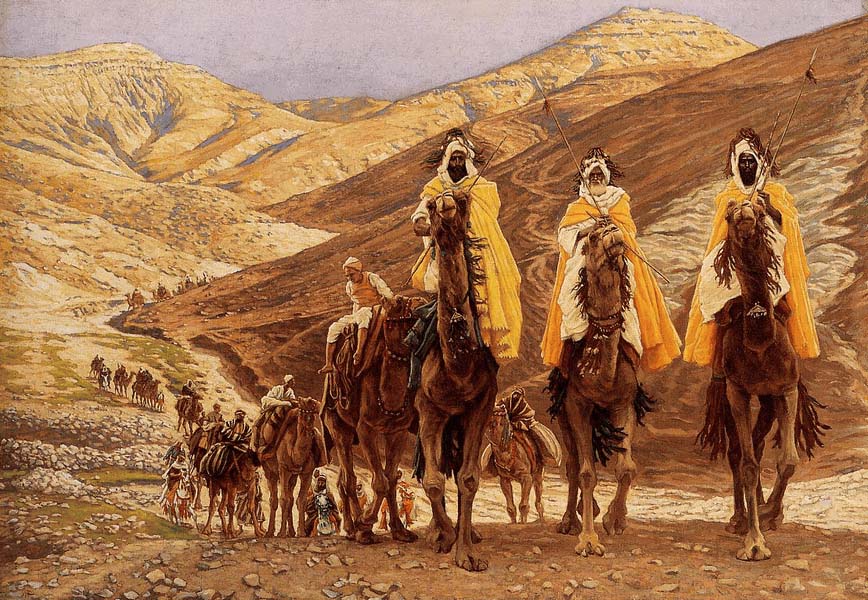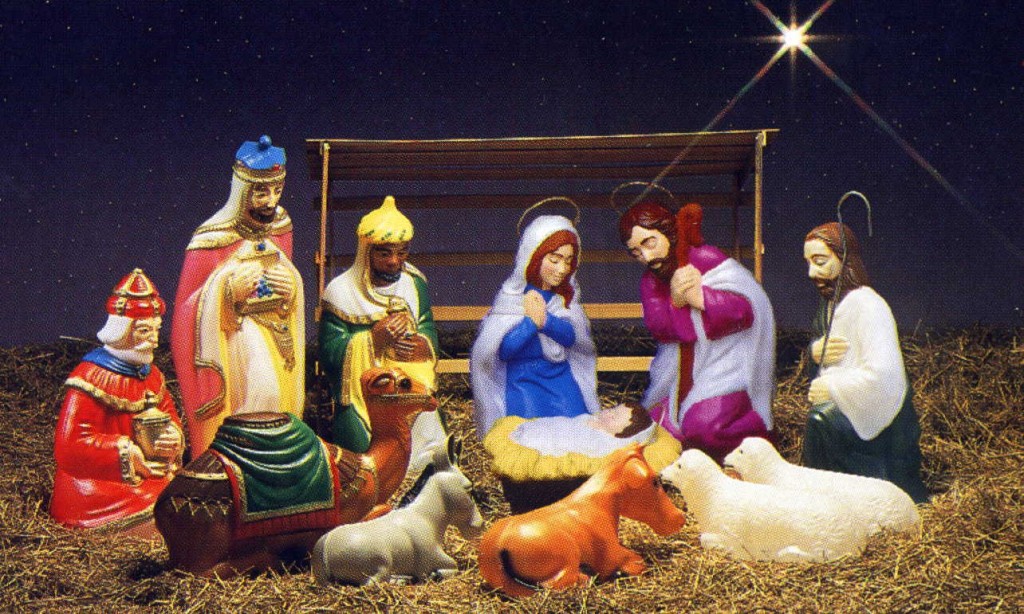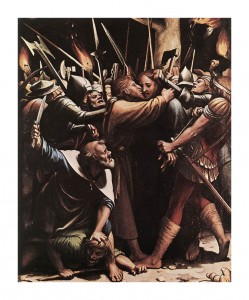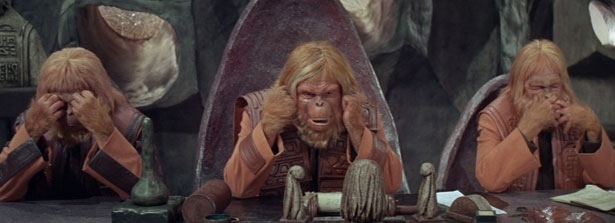The Last Supper & The Meaning of The Cross

One thing that can’t be denied when reading the gospel accounts of Jesus’ life is that Jesus’ death was no accident. Jesus was not just going about his business, teaching people to love and performing miracles; and one day, out of the blue, he was kidnapped and crucified. All the accounts explicitly tell of Jesus’ resolute and deliberate plan to go to Jerusalem where the Jewish authorities were waiting to kill him. Consider Mark 10:32-34…
They were on their way up to Jerusalem, with Jesus leading the way, and the disciples were astonished, while those who followed were afraid. Again he took the Twelve aside and told them what was going to happen to him. “We are going up to Jerusalem,â€Â he said, “and the Son of Man will be delivered over to the chief priests and the teachers of the law. They will condemn him to death and will hand him over to the Gentiles, who will mock him and spit on him, flog him and kill him. Three days later he will rise.â€
Jesus’ death, was for Jesus the climax of his short 3 year ministry. It was where it was all heading. It was the point.
This is why the image of the cross is the symbol that represents Christianity. The death of Jesus is at the heart of what Christians are on about. It is at the core of our message. As Paul writes, “Jews demand signs and Greeks look for wisdom, but we preach Christ crucified.” (1 Corinthians 1:22-23)
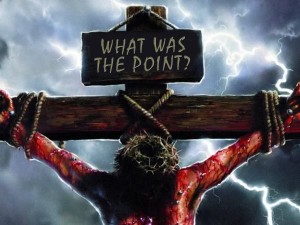
The natural question that arises from this is… why? What’s the point? Couldn’t Jesus have done a lot more good if he stuck around for longer? I mean, he could have travelled the world preaching and healing and gaining followers. That’s true. So, we can rightly conclude that teaching and healing was not the primary goal of his mission and his ministry. Clearly, at least he believed, he could do more good by dying than he could if he lived. But what good did he do by dying? What did his death achieve?
Now, this question has been asked by many and is the source of some debate – especially more recently. But this debate does not arise from the New Testament being unclear on the topic. There are countless places in the New Testament (and Old Testament) that explain it. For now, I’m just going to include one reference. It comes from the writings of possibly Jesus’ closest friend and disciple, who was acknowledged as one of the key leaders in the early church. This is of course, the apostle Peter. As he explains, something supernatural was happening when Jesus died…
“He himself bore our sins in his body on the cross, so that we might die to sins and live for righteousness; By his wounds you have been healed… For Christ suffered once for sins, the righteous for the unrighteous, to bring you to God.” (1 Peter 2:24 & 3:18)
Now as you may know, Paul the apostle has also written many epistles explaining the meaning of the death of Christ, and I’d love to include many of his great passages, but I decided not to. You see, for an odd reason, some people think that Paul single-handedly invented the idea that Jesus died as a sacrifice to atone for our sins. They claim that the idea of the atonement is not really found other than in Paul’s writings and that the gospels don’t mention this concept at all!
When I was first challenged on this idea by someone many years ago, it was by a Biblical scholar who was many years my senior and I really didn’t know how to respond. On the spot, I couldn’t think of too many places outside of Paul’s writings where Jesus’ death was described as a sacrifice or as something that bore our sins. I am now very sad that I can’t have that conversation all over again! The more I read and understand Scripture, the more I am utterly convinced that there is no way in which you can faithfully read the gospels about Jesus without accepting that this teaching is undeniably there. Passages like the one above are too clear and too frequent.
 So why do people claim it is not there? Well, initially it might be due to lack of knowledge about how the New Testament epistle writers like Peter and John back up Paul’s writing on the purpose of Jesus’ death. It may also be that they don’t know the places in the four gospels where this is explained as well. Despite this, more and more I see people who claim to know the New Testament and claim to be faithful to the gospels and its message, who are disregarding the atonement all together. They argue that Jesus’ death did not spiritually achieve anything, but was an act of courageous martyrdom or simply a great example to us about how we should die for what you believe in – like the Buddhists monk, Thich Quang Duc, who in 1963 famously committed self-immolation as a form of protest against the persecution of Buddhists in Cambodia.
So why do people claim it is not there? Well, initially it might be due to lack of knowledge about how the New Testament epistle writers like Peter and John back up Paul’s writing on the purpose of Jesus’ death. It may also be that they don’t know the places in the four gospels where this is explained as well. Despite this, more and more I see people who claim to know the New Testament and claim to be faithful to the gospels and its message, who are disregarding the atonement all together. They argue that Jesus’ death did not spiritually achieve anything, but was an act of courageous martyrdom or simply a great example to us about how we should die for what you believe in – like the Buddhists monk, Thich Quang Duc, who in 1963 famously committed self-immolation as a form of protest against the persecution of Buddhists in Cambodia.
The main reason why I think they feel compelled to do this is because the concept of “Jesus dying for our sins” raises lots of philosophical questions for people. How does it work? What does that say about God the Father? Or Jesus’ divinity? Or the reality of God’s judgement and Hell? Or even just the reality of sin? It brings up lots of tricky concepts that, in the end, are not very palatable for many people. And so, instead of grappling with the truth of these ideas or rejecting Jesus altogether, they ignore some clear parts of the New Testament to fit a more palatable message. No longer are we sinners who deserve judgment from a Holy Creator. No longer is Jesus’ death the sacrifice that pays for our sins and provides us with a way of reconciliation with God. The good news is changed so that it is no longer about something that Jesus has done for us, but it becomes about something that we can do… inspired by him.
This version of the gospel may be much more palatable and raise less philosophical questions, but it simply is not faithful to the New Testament. I’m not saying that Jesus’ death is not supposed to be an example for us of self-sacrifice, but to reduce it to that and not see the countless places the New Testament speaks of it as something much, much greater, is to be like someone spending $24 to admire the cup holders in the chairs during an IMAX movie. Worth acknowledging, but not really the point of it all.
But a question remains… What did Jesus think about his own death? Have the other writer’s of the New Testament like Peter and Paul just gotten Jesus wrong? Did Jesus ever talk about his death being a sacrifice for sin? Well, the answer is yes – several times. In fact, he never talked about his death being an example of loving self-sacrifice. If you want that concept, go to the story where he washes his disciples feet (John 13:14-15). When it comes to the cross, Jesus talks about it as a deliberate, purposeful and cosmically significant sacrifice. In his mind he was heading to Jerusalem to achieve something tangible. He was going to pay for our sins with his own death.
Now, I could write several blogs going through all the places where this is found in the gospels, but for now, I will just look at one. It is in one powerfully significant line that Jesus said during the Last Supper…
“This is my blood of the covenant, which is poured out for many for the forgiveness of sins.” (Matthew 26:28)
THE LAST SUPPER

If you don’t know the story, the Last Supper is the Passover meal that Jesus ate with his disciples on the night before he was crucified. The gospels record that Jesus had timed his arrival into Jerusalem perfectly so that the Passover would fall at the same time he would be arrested and crucified.
The Passover is one of the most significant festivals on the Jewish calendar, where Jews remember God’s great act of saving them from his own judgement. That’s right. Not saving them from the evil oppression of the Egyptians. The Passover commemorates the time God told his people he would judge every single household, other than those who had the blood of a sacrificed lamb painted on their doorposts. Sound gruesome, I know, but that’s the story. If you had the blood on your door, then it was a sign that a lamb had been sacrificed in your place and God would “pass over” your house.
Every year since then, Jews would sacrifice a “passover lamb” and have a special symbolic meal as an act of remembrance. This is why Jesus chose the Passover as the time to die. He was, as John the Baptist declares, “the Lamb of God, who takes away the sin of the world!” (John 1:29) and as Paul writes, “For Christ, our Passover lamb, has been sacrificed.” (1 Corinthians 5:7) Jesus was what the Passover was looking forward to. Jesus is the lamb that would be sacrificed in the place of anyone who would put their trust in him. He is the true fulfilment of the Passover.
 It is during this Passover meal that Jesus decides to initiate a new symbolic meal. This new meal would no longer remember the Passover, but since the Passover was being fulfilled and replaced by Jesus and his death, this is what would now be remembered. This new symbolic meal is now commonly known now as “Communion” or “The Lord’s Supper” and is today celebrated by pretty much all Christians across the world.
It is during this Passover meal that Jesus decides to initiate a new symbolic meal. This new meal would no longer remember the Passover, but since the Passover was being fulfilled and replaced by Jesus and his death, this is what would now be remembered. This new symbolic meal is now commonly known now as “Communion” or “The Lord’s Supper” and is today celebrated by pretty much all Christians across the world.
As all four gospels record, at the Last Supper Jesus uses two elements of the Passover meal – bread and wine – as a visual aid to explain what was going to happen to him and what it was going to mean. He took the bread and broke it, explaining that the same thing would happen to his own body. “This is my body given for you.” (Luke 22:19) And then he took the red wine (a perfect visual symbol for blood) and said those potent and profound words, “This is my blood of the covenant, which is poured out for many for the forgiveness of sins.” (Matthew 26:28)
From this, we can see Jesus explains three things about his blood. Firstly, it’s going to be poured out – as in, he’s definitely going to die. Secondly, his death is going to somehow achieve the forgiveness of sins. And thirdly, his blood is the “blood of the covenant”.
THE BLOOD OF THE COVENANT
The “blood of the covenant” is not just any old phrase. It is only used in one other place in the Bible. Jesus’ disciples would have known the story Jesus was referring to and how significant it was that he was using it in reference to his own blood.
After the events of the Passover and the escape from Egypt, the story of Exodus eventually leads up to another very significant moment in Jewish history. God has rescued his people from his own judgement and redeemed them from slavery. He now gives them the famous Ten Commandments and the law that instructs them how – as rescued people – they should now live and relate to God and each other. This is when what is called the “Mosaic Covenant” is established.

A “covenant” is like an alliance or solemn relational contract that is made between two parties. Marriage, for example, is described in the Bible as a covenant (Malachi 2:14). More often though, a covenant is used when a commitment between God and his people is made and a new relationship is established. In the thousands of years of Biblical history, there were only very few covenants made. This is because they were so significant and they mark key moments in the ongoing relationship between God and mankind.
Each covenant usually contains a few elements. Like promises made between both parties, consequences for breaking the covenant, and a “sign” that would remind both parties of the promises made (think for example, “circumcision” with the Covenant with Abraham and the rainbow with the Covenant with Noah). Lastly, each covenant with God usually also involves a sacrifice. As we have already seen, a sacrifice was often a representation of the consequences of the judgement of God. The slaughtered animal reminded the person that their sin deserved death and that without a substitute to bear that death for them, they would face God’s judgement themselves. It wasn’t all gloom and doom though. A sacrifice also gave the people hope. Hope that even when they would inevitably break their promises, God would provide a way that they could be forgiven and remain in the covenant.
During the establishment of the “Mosaic Covenant” two types of sacrifices were made – burnt offerings and fellowship offerings. If you look up the Old Testament instruction manual on what these two sacrifices are all about (Leviticus 1 & 3), you see that those who perform the sacrifice would place their hand on the head of the animal – symbolically transferring the guilt of the person to the animal. The animal would then be killed in the place of the guilty party, and then, as God told them, “it will be accepted on your behalf to make atonement for you.” (Leviticus 1:4)
Read here what Moses did with the blood taken from these atoning sacrifices, as recorded in Exodus 24:4-8, and look out for the phrase the “blood of the covenant” that Jesus was referring to…
Moses then wrote down everything the Lord had said. He got up early the next morning and built an altar at the foot of the mountain and set up twelve stone pillars representing the twelve tribes of Israel. Then he sent young Israelite men, and they offered burnt offerings and sacrificed young bulls as fellowship offerings to the Lord. Moses took half of the blood and put it in bowls, and the other half he splashed against the altar. Then he took the Book of the Covenant and read it to the people. They responded, “We will do everything the Lord has said; we will obey.â€Â Moses then took the blood, sprinkled it on the people and said, “This is the blood of the covenant that the Lord has made with you in accordance with all these words.â€

So, the “Mosaic Covenant” was established with the blood of atoning sacrifices being sprinkled over the people. Gross, I know. But what a potent symbol! The “blood of the covenant” marked this new relationship between God and his people, and was a stark and rather disgusting reminder that their promise to always obey everything the Lord has said would inevitably fail, and that atonement would be needed for forgiveness to be possible.
This was not an unfamiliar message for God’s people, as atoning sacrifice was a part of their every day life. Although God has shown the Jewish people particular favour, their ongoing relationship with God was not without cost. It was marked by daily sacrifices that reminded the people that there was a major ongoing problem between them and God. God wanted relationship but they could only come to him on the basis of blood and sacrifice.
If this idea seems odd and unnecessary to you, then you may not have ever realised how your sin separates you from God. You should hear what God is saying in the Old Testament sacrifices as a powerful wake-up call as to the seriousness of sin and the fact that we are in desperate need for an atoning sacrifice to provide the way for forgiveness.
In any case, this whole bloody episode with Moses and the phrase, “this is the blood of the covenant” is the concept that Jesus is referring to when he uses the same words in reference to his own blood the night before he died.
JESUS AND THE NEW COVENANT
Jesus is ultimately the fulfilment of all the Old Testament covenants and his death on the cross is the sacrifice that each covenant’s sacrifice is foreshadowing and pointing to.
 When Jesus talks of his own blood as being the “blood of the covenant” he is telling his disciples that a new covenant that fulfils the Mosaic Covenant is being established. As with the burnt offerings and fellowship offerings, Jesus is saying that it would be like we were putting our hand on his head and our guilt before God was being transferred to him. As Peter described it, “He himself bore our sins in his body on the cross.” So, in his death, he would be bearing our sins. He would be our atoning sacrifice and his death would be the blood of this new covenant.
When Jesus talks of his own blood as being the “blood of the covenant” he is telling his disciples that a new covenant that fulfils the Mosaic Covenant is being established. As with the burnt offerings and fellowship offerings, Jesus is saying that it would be like we were putting our hand on his head and our guilt before God was being transferred to him. As Peter described it, “He himself bore our sins in his body on the cross.” So, in his death, he would be bearing our sins. He would be our atoning sacrifice and his death would be the blood of this new covenant.
This is why Jesus says, “This is my blood of the covenant, which is poured out for many for the forgiveness of sins.” It can not be clearer that Jesus saw his death as being a sacrifice for our sins. His death would make the way, once for all, for our sin to be forgiven. No longer would animal sacrifices be needed. No longer would the Passover be required. Jesus was establishing a new covenant and his death was the means that makes it possible.
This is why Jesus believed that he could do more good if he died than if he lived. This is why Jesus’ death was the goal and climax of his mission. This is why the sign of the cross is the symbol of Christianity. It is the death of Jesus that pays for our sin and establishes a new relationship between God and mankind for those that would trust in it.
CONCLUSION
Now, you may not believe any of the things I have written about. I hope you do, but I understand there are a lot of concepts like covenants and sacrifices and sin that build upon each other. If you don’t understand one (or if you have a big problem with one) then all the others may not make sense either. For you, I have not written this blog to try to convince you of their truth. I only hope that you see that the old idea that “Jesus died for your sins” is actually faithful to all the writers of the New Testament. More important than that, it is faithful to Jesus’ own understanding of why he was so determined to die for you. You may think Jesus was mistaken, but at least you will be able to see that those who claim that the idea of the “atonement” is not there, are just not reading the text.
Also, I hope that if one day you chose to consider the claims of Christ, you will know what Jesus honestly taught about the meaning of his death in your place.
 For those who are already disciples of Jesus – who have accepted Jesus death for what Jesus said it would be, and who know the joy of forgiveness and reconciliation with God – may you do what Jesus asked you to do at the Last Supper… May you remember him and his death for you. Not only when you take “communion” and hold those elements of broken bread and red wine in your hands, but every day, and especially at this time of Easter when these words and events are retold and we are reminded of their reality and significance.
For those who are already disciples of Jesus – who have accepted Jesus death for what Jesus said it would be, and who know the joy of forgiveness and reconciliation with God – may you do what Jesus asked you to do at the Last Supper… May you remember him and his death for you. Not only when you take “communion” and hold those elements of broken bread and red wine in your hands, but every day, and especially at this time of Easter when these words and events are retold and we are reminded of their reality and significance.
FURTHER STUDY
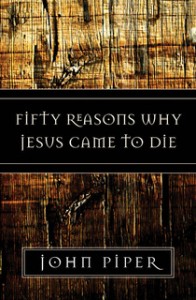 I acknowledge that my blog here focusses on only one verse in the Bible that explains why Jesus died, so if  you want to understand more about what the death of Jesus was all about, I can recommend an ebook by John Piper called, “Fifty Reasons Why Jesus Came to Die”. It will give you heaps more to think about! Download a FREE copy: HERE
I acknowledge that my blog here focusses on only one verse in the Bible that explains why Jesus died, so if  you want to understand more about what the death of Jesus was all about, I can recommend an ebook by John Piper called, “Fifty Reasons Why Jesus Came to Die”. It will give you heaps more to think about! Download a FREE copy: HERE
If on the other hand, you are intrigued by the connections between the Old Testament sacrifices and the work of Jesus, I highly recommend you take a look at the Book of Hebrews in the New Testament. It is written specifically to explain how Jesus fulfils the Old Testament and Chapters 8-10 especially help to explain how Jesus fulfils the Old Testament sacrificial system. There may be lots of ideas that are weird or confusing, but it’s well worth the study.
I’ll leave you with some wonderful words from Hebrews 13:20-21…
Now may the God of peace,
who through the blood of the eternal covenant
brought back from the dead our Lord Jesus, that great Shepherd of the sheep,
equip you with everything good for doing his will,
and may he work in us what is pleasing to him, through Jesus Christ,
to whom be glory for ever and ever.
Amen.
HAPPY EASTER!
(5432)

